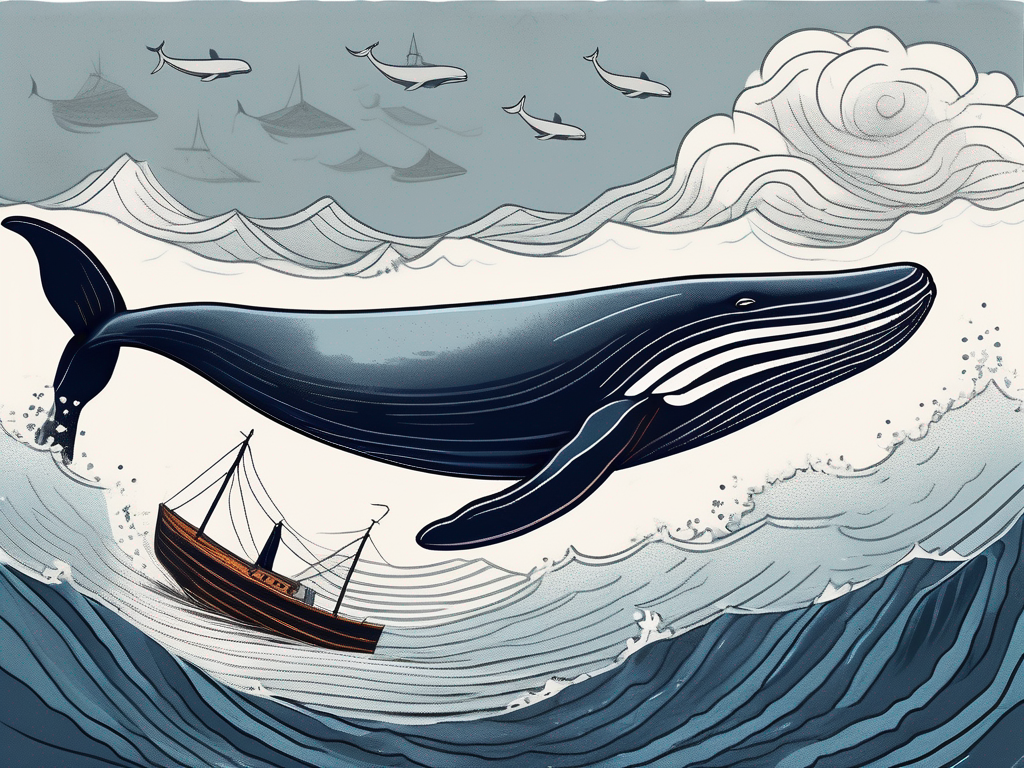Have you ever heard the story of Jonah and the Whale? It’s a tale that has captivated audiences for centuries, with its intriguing characters, powerful lessons, and cultural impact. In this article, we will explore the various aspects of this fascinating story, gaining a deeper understanding of its meaning and significance. So, let’s dive in and uncover the secrets of Jonah and the Whale!
Understanding the Story of Jonah and the Whale
Before we delve into the details, let’s familiarize ourselves with the biblical account of Jonah’s journey. According to the scriptures, Jonah was a prophet who received a divine command to go to the great city of Nineveh and deliver a warning from God. However, instead of obeying, Jonah chose to flee from his responsibilities by boarding a ship bound for Tarshish.
But here’s where the story takes a surprising turn. While Jonah was at sea, a great storm arose, threatening to destroy the ship and everyone on board. In a desperate attempt to save themselves, the sailors cast lots to determine who was to blame for their misfortune – and Jonah was the guilty party. Jonah confessed his disobedience and urged the sailors to throw him overboard, believing that it would calm the storm.
And that’s when the extraordinary happens. As soon as Jonah is thrown into the raging sea, a gigantic whale swallows him whole. Miraculously, Jonah survives in the belly of the whale for three days and three nights before being vomited onto dry land. It is only then that Jonah finally decides to fulfill his divine mission and heads to Nineveh to deliver God’s message of repentance.
But what happened during those three days and three nights inside the belly of the whale? The biblical account leaves us with many questions and a sense of wonder. Did Jonah find solace in the darkness, contemplating his actions and seeking forgiveness? Or was he consumed by fear and despair, wondering if he would ever see the light of day again?
The Biblical Account of Jonah’s Journey
In the biblical account, Jonah’s journey serves as a profound metaphor for the consequences of disobedience and the redemptive power of repentance. Jonah’s choice to run away from his responsibilities leads to not only his own suffering but also the peril of those around him. The storm at sea symbolizes the chaos and turmoil that result from turning our backs on God’s plan for us.
However, it is in the belly of the whale that Jonah experiences a transformative moment. Cut off from the world and faced with his own mortality, Jonah realizes the futility of his disobedience. It is here that he offers a heartfelt prayer of repentance, acknowledging his wrongdoing and seeking forgiveness from the Almighty. And in response to his sincere plea, God shows mercy and delivers Jonah from the clutches of the whale.
But what was Jonah’s prayer like? Did he beg for forgiveness with tears streaming down his face, or did he speak with a calm and resolute voice, accepting his fate and vowing to change his ways? The details of Jonah’s prayer are left to our imagination, but one thing is clear – it was a moment of deep introspection and surrender.
The Symbolism Behind the Whale
Now, let’s explore the symbolism behind the whale in this tale. The whale is not merely a sea creature but also a powerful metaphor for both judgment and salvation. In swallowing Jonah, the whale becomes a vessel of punishment, highlighting the consequences of disobedience. Yet, it is also within the belly of the whale that Jonah finds redemption, as he turns to God and seeks forgiveness.
But why a whale? Why not another creature or natural phenomenon? The choice of a whale as the vessel of Jonah’s punishment and salvation is significant. Whales are majestic creatures, known for their immense size and strength. In the story of Jonah, the whale represents the overwhelming power of God’s judgment and the magnitude of His mercy.
The story of Jonah teaches us that even in our darkest moments, there is always hope. The whale represents the second chance that God graciously offers each of us, even when we have strayed from the right path. It reminds us that redemption and forgiveness are always within reach, no matter how far we may have wandered.
So, as we reflect on the story of Jonah and the whale, let us remember the lessons it imparts – the consequences of disobedience, the transformative power of repentance, and the boundless mercy of God. May we find inspiration in Jonah’s journey and strive to live a life aligned with God’s will.
The Characters in the Tale
Now, let’s shift our attention to the intriguing characters that populate Jonah’s tale. First and foremost, we have Jonah himself – the reluctant prophet. Jonah’s initial refusal to obey God’s command reflects the struggle we all face between our own desires and God’s will. His story serves as a reminder that it is crucial to approach our responsibilities with obedience and humility.
But let’s delve deeper into Jonah’s character. What led him to be so reluctant? Was it fear of the unknown or a lack of faith in God’s plan? Perhaps Jonah was comfortable in his own routine and didn’t want to disrupt his life. Whatever the reasons may be, Jonah’s reluctance resonates with us because we have all experienced moments of resistance to change and uncertainty.
However, Jonah’s character is a complex one. While he starts off as a disobedient and somewhat self-centered individual, he ultimately undergoes a transformative journey that leads to his redemption. As the story unfolds, we witness Jonah’s growth and development. His encounter with the whale becomes a turning point, a moment of reckoning that forces him to confront his own shortcomings and surrender to God’s will.
Jonah: The Reluctant Prophet
Jonah’s story reminds us that personal growth and change are always possible, regardless of our past mistakes. It teaches us that even the most reluctant among us can find redemption and purpose. Jonah’s journey is a testament to the power of second chances and the transformative nature of divine intervention.
Moreover, Jonah’s story raises questions about the nature of prophecy and the responsibilities that come with it. What does it mean to be a prophet? Is it a burden or a privilege? Jonah’s initial reluctance to fulfill his prophetic duty sheds light on the weight of such a calling. It reminds us that being chosen by God for a specific task is not always easy, and it requires us to confront our own limitations and fears.
The Whale: More than Just a Sea Creature
As we mentioned earlier, the whale in this tale is more than just a sea creature. It serves as a vessel of judgment, punishment, and ultimately, salvation. The whale’s presence emphasizes the consequences of Jonah’s actions and becomes the catalyst for his transformation. It represents the power and mercy of God, who can turn even the direst circumstances into moments of redemption.
But let’s explore the symbolism behind the whale further. In many ancient cultures, whales were seen as creatures of great wisdom and spiritual significance. They were believed to possess deep knowledge and were often associated with the divine. In Jonah’s story, the whale’s role goes beyond being a mere plot device. It embodies the divine intervention that shapes Jonah’s destiny and brings about his redemption.
Furthermore, the whale’s role as both a judge and a savior raises questions about the nature of divine justice. Why did God choose to punish Jonah by sending him into the belly of a whale? Was it a form of discipline or a means of teaching him a valuable lesson? The whale’s presence invites us to reflect on the complexities of divine justice and the ways in which God’s plans unfold in mysterious and unexpected ways.
The Lessons from Jonah’s Tale
Now that we have explored the story and its characters, let’s delve deeper into the profound lessons that Jonah’s tale imparts to us.
The Consequences of Disobedience
One of the central themes of Jonah’s story is the consequences that come with disobedience. Jonah’s decision to run away from his responsibilities not only endangers his own life but also puts the lives of others in jeopardy. It reminds us that our actions have far-reaching consequences, and it is crucial to align ourselves with God’s plan rather than our own desires.
When Jonah boarded the ship to Tarshish, he thought he could escape God’s command to go to Nineveh. Little did he know that his disobedience would lead to a violent storm that threatened to capsize the ship. The sailors, realizing that Jonah was the cause of their misfortune, threw him overboard to appease the angry sea. Jonah’s disobedience not only endangered his own life but also put the lives of innocent sailors at risk.
As Jonah was swallowed by a great fish, he found himself in the belly of the whale, surrounded by darkness and despair. It was in this desperate situation that Jonah finally recognized the gravity of his disobedience and cried out to God for help. The consequences of his actions became clear to him, and he realized the need to align himself with God’s will.
The Power of Repentance and Forgiveness
Another powerful lesson from Jonah’s tale is the redemptive power of repentance and forgiveness. Jonah’s prayer of repentance in the belly of the whale highlights the transformative effect of acknowledging our mistakes and seeking forgiveness from God. It teaches us that no matter how dire our circumstances may seem, there is always hope for redemption if we turn back to God with a sincere heart.
Jonah’s prayer in the belly of the whale is a profound example of true repentance. He acknowledges his disobedience, his attempt to flee from God’s presence, and his recognition of God’s sovereignty. In his prayer, Jonah expresses deep remorse for his actions and pleads for God’s forgiveness. It is through this act of repentance that Jonah finds redemption and is ultimately saved from the belly of the whale.
This lesson of repentance and forgiveness extends beyond Jonah’s personal journey. It serves as a reminder to all of us that no matter how far we may have strayed from God’s path, there is always an opportunity for reconciliation and forgiveness. Just as God forgave Jonah and gave him a second chance, He offers the same grace and mercy to each one of us.
In conclusion, Jonah’s tale teaches us valuable lessons about the consequences of disobedience and the power of repentance and forgiveness. It reminds us to align ourselves with God’s plan, to recognize the far-reaching consequences of our actions, and to seek forgiveness when we fall short. By internalizing these lessons, we can grow in our faith and strive to live a life that is pleasing to God.
The Cultural Impact of the Story
Throughout history, the story of Jonah and the Whale has had a significant influence on various aspects of culture, including literature, art, and popular culture. Let’s take a closer look at these cultural impacts.
Influence on Literature and Art
The tale of Jonah and the Whale has inspired countless literary works and artistic interpretations over the years. From ancient paintings to modern-day novels, the story continues to captivate artists and writers. Its rich symbolism and moral lessons make it a fertile ground for creative exploration and expression.
The Story’s Presence in Popular Culture
Jonah’s story has also made its way into popular culture, with references popping up in movies, music, and even cartoons. The central themes of redemption, second chances, and the power of faith resonate with audiences of all ages, making Jonah and the Whale a timeless tale that continues to be retold and reimagined.
Theological Interpretations of the Story
As a widely recognized biblical account, Jonah’s tale has garnered numerous theological interpretations over the years. Let’s examine some of the different religious perspectives on this captivating story.
Different Religious Perspectives on Jonah’s Tale
Within Christianity, Judaism, and Islam, Jonah’s story is interpreted and emphasized in different ways. These interpretations focus on various aspects, such as repentance, obedience to God’s commandments, and the theme of divine mercy. Regardless of the specific theological lens through which one approaches the story, Jonah’s tale resonates with believers across different faith traditions.
Modern Day Interpretations and Controversies
In more recent times, Jonah’s story has sparked discussions and controversies regarding its historical accuracy. Some scholars approach the story as a literal account, while others view it as allegorical or mythic. These debates only serve to highlight the enduring fascination and impact of Jonah and the Whale in contemporary religious and academic circles.
Conclusion
So, there you have it – the fascinating tale of Jonah and the Whale, dissected and explored from various perspectives. Through Jonah’s disobedience, transformation, and redemption, we learn valuable lessons about the consequences of our actions and the transformative power of repentance. The story’s cultural impact, rich symbolism, and theological interpretations make it a captivating and thought-provoking narrative that continues to engage and inspire audiences around the world. The story of Jonah and the Whale reminds us of the unfailing mercy and love of God, who is ever ready to offer us a second chance, no matter how far we may have strayed.
So, the next time you come across the tale of Jonah and the Whale, take a moment to reflect on its timeless messages and the lessons it holds for us all.












